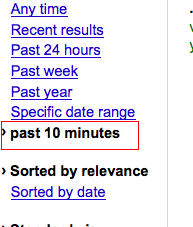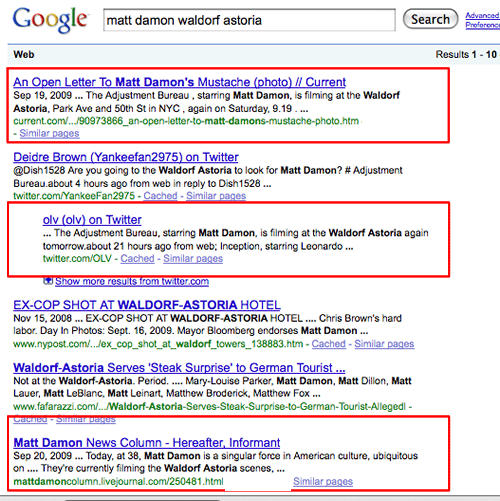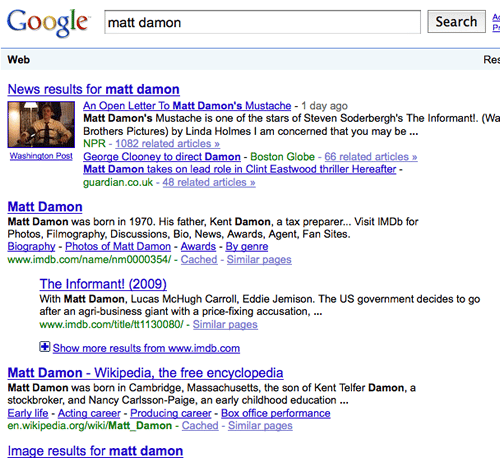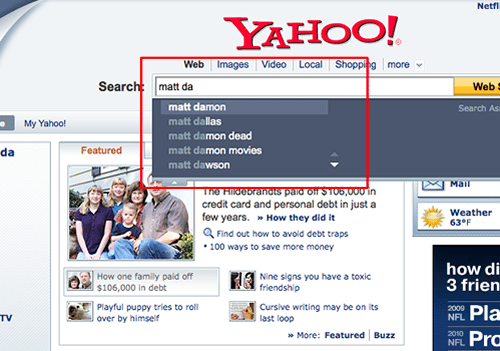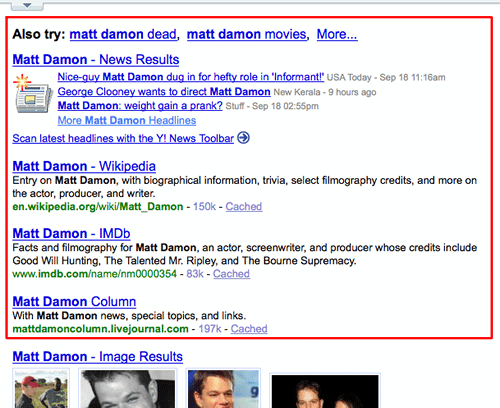I had a near out of body-real-time SMS/search/tweet experience last night interacting with our attorney, Laura. (No, the picture’s not Laura.) She’s in Manhattan to attend the Social Media Risks and Rewards legal conference, and pinged me to quick-search for information about a ruckus she was observing outside the famed Waldorf Astoria.
Our innocent little text exchange and my ensuing searches (illustrated later in this article) make it entirely clear there’s a radical new type of query intent (what users’ are looking for): situational. It turns out Google’s not adept at some situational searches which, to some minds, leaves them vulnerable to services like Twitter in a substantial segment of emerging search inventory.
Situational searches happen when users seek information about transient or faster moving events, not necessarily the most important happenings in the world-by-the-numbers, but very important to someone. For instance a situational search is when a user wants to know why an unexpected motorcade is driving through town or a street corner crowd gathered. An explosion on the horizon, before news outlets and search engines grab hold of the buzz, also qualifies as situational.
Situational searches can be associated with micro demographics or massive constituencies. This evolving query type surrounds users who want to know now, in the moment, about something happening and faster than last-gen search engines index human activity.
Query Intent Background
Research-types dissemble categories of query-intent by user’s purpose. The classic subdivision breaks out as follows: a) navigational (searcher looking for specific site) b) Informational (research oriented) c) Transactional (ready to do something like buy). So goes traditional thinking.
The new kid on the block, “situational,” wasn’t possible in previous generations of search. The reason why is simple. There were few mainstream real-time platforms or users who were searchable. Now there’s Twitter, Facebook, Google’s last few minutes-index, etc… There should be little doubt that Twitter does situational best. They have the real-time user base, conditioned to share in-the-moment events. Google does not have similarly conditioned users.
Now let’s get back to the text exchange with Laura, which clarifies situational searches beautifully. For TwitterSearch naysayers, we hope this anecdote, regarding Twitter and situational searches, sheds light regarding the value of such services and illustrates Google’s blind spot.
TEXT MESSAGES
L (Laura from New York): “See who is at Waldorf Astoria tonight, major security. Machine guns.”
M (Marty in Duluth): “Hold on.”
L: “Looked like secret service earlier.”
M “Hold on, searching…brb [be right back]”
I Spring Into Action!
First I scanned the top of unpersonalized Google search engine results pages (SERPs) for “Waldorf Astoria.” There was nothing there to help me figure out why there might secret service types outside now.
The rest of the page yielded no clues.
I then tried Google’s “Indexed in Last 10 Minutes” feature to see if there was anything newly indexed…nothing.
…checked out Bing: Nada, nothing, zilch…
I was thinking maybe Facebook would yield real-time fruit. Nope!
However, there are a bunch of dudes named Waldorf Astoria (hmmm)
Then it came to me, TWITTER! A quick Twitter search…
…SCORE! It turns out Matt Damon was shooting a movie at the Waldorf Astoria last night. Insiders were tweeting about it. Twitter was the search engine to solve my situational search.
RESUME TEXT MESSAGES
M: Waldorf is a Matt Damon movie set now
L: Shut up
M: (text Twitter search string to Laura’s Blackberry)
L: [He] “hasn’t shown up yet”
M: “Do you believe in Twitter now?”
L: “F U”
L: “Facebooked it :)”
M: “Bye 4 now”
L: “Later”
The Morning After
I was curious to see how mainstream SERPs looked the next morning. Now that it was clear that the event was about “Waldorf Astoria Matt Damon,” I wanted to search Google again.
There was some previously indexed content as well as an index tweet from the night before. The older content was probably there the evening before. There was just no possible way we could have known that the event was about Matt Damon.
How about GoogleNews, searching for “Matt Damon?” After all, this is what Matt’s working on… now… today. Nothing.
How about Yahoo!? Was there anything indexed the morning after?
Even Yahoo, show-biz skank of mainstream search engines, could not associate Matt Damon with the Waldorf shoot.
Situational searches are the new query-intent type. They occur when users want to find out about new and/or rapidly moving situations. Google and other traditional search engines can’t generate this real-time feed because, unlike Twitter & Facebook, Google has never socialized users successfully. The lack of engaged real-time user pool is a serious barrier to entry. Sure Google can index Twitter but the result is kind of lame. We’ll get more into that in future posts.
Also there are hybrid intents, no doubt. For instance those searching for Dell Computer sweat-tweet in-the-moment 1-computer deals are doing “transactional situation searches.”
For any TwitterSearch naysayers, we hope a heightened understanding of situational search lends perspective on the value of such micro-blogging services, as they exist now and in the future.



